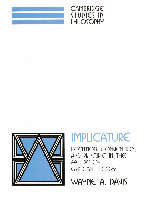1 - Concept and theory
Published online by Cambridge University Press: 20 March 2010
Summary
Grice (1957) drew an important distinction between what a speaker means or implies and what a sentence or other expression means or implies. The sentence “The airplane is a mile long” means the airplane is 5,280 feet long and implies the plane is over 3,279 feet long. Nevertheless, it would be most unlikely for a speaker uttering the sentence to mean or imply such things unless he were pulling someone's leg. More likely, the speaker would be exaggerating, meaning simply that the airplane is enormous compared with typical planes. A speaker using the sentence in a coded message might mean something completely unrelated to its English meaning.
As a first approximation, word meaning may be characterized as conventional speaker meaning. Whereas we could conceivably use “bachelor” to mean just about anything, we conventionally mean “unmarried male,” which is what the word means. Speaker meaning is determined by the intentions of the individual speaker. The exact intentions required are a matter of controversy. On my view, S means that the airplane is enormous only if S used the sentence to express the belief that the plane is enormous, which entails that S did something in order to provide an indication of that belief. In one typical case, S would have the further intention of producing the belief in the audience. Speaker implication is indirect speaker meaning: meaning one thing by meaning another. A boy who implies he cannot go to the movies by saying, “I have to study” has expressed the belief that he cannot go by expressing the belief that he has to study.
- Type
- Chapter
- Information
- ImplicatureIntention, Convention, and Principle in the Failure of Gricean Theory, pp. 4 - 32Publisher: Cambridge University PressPrint publication year: 1998



